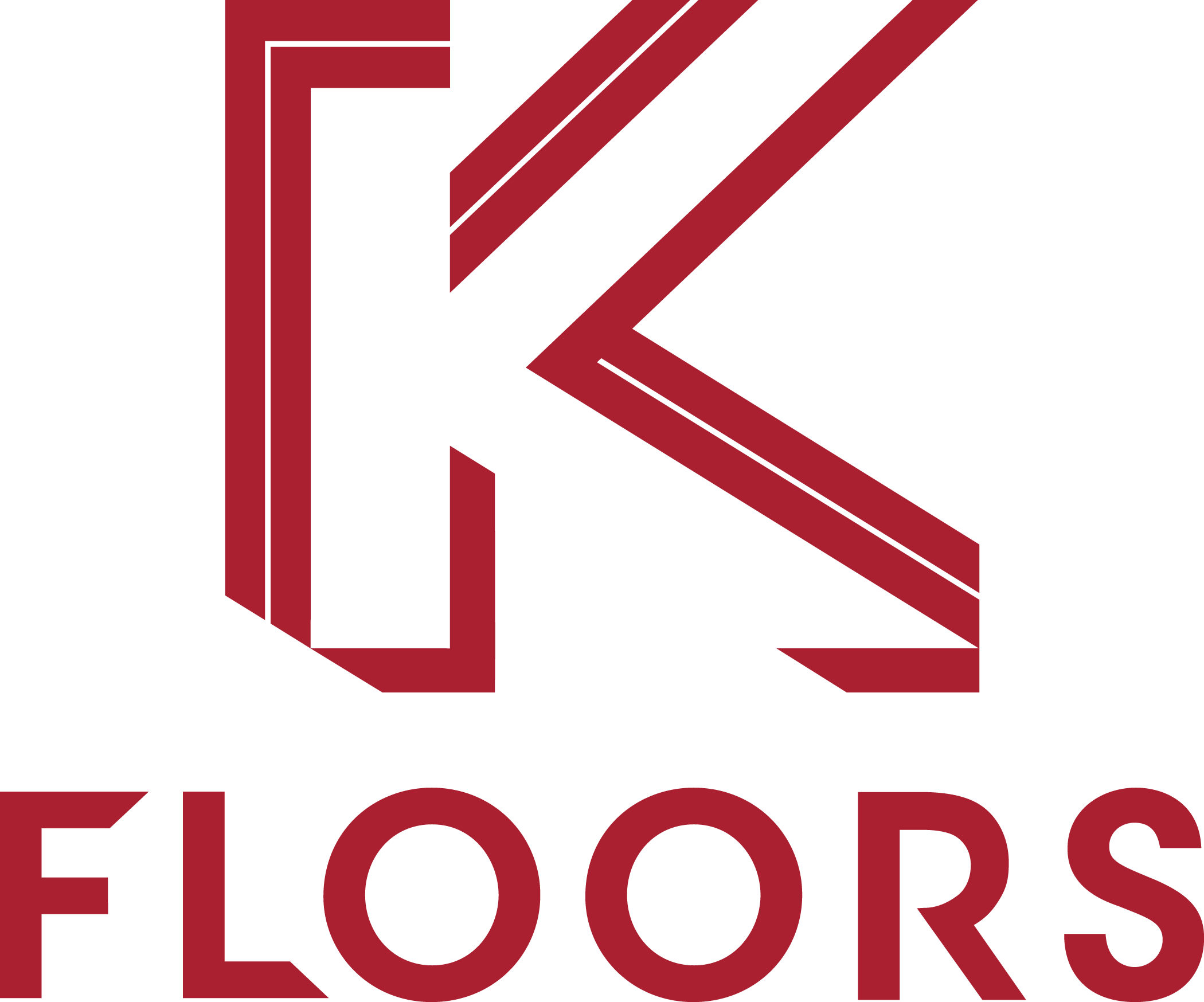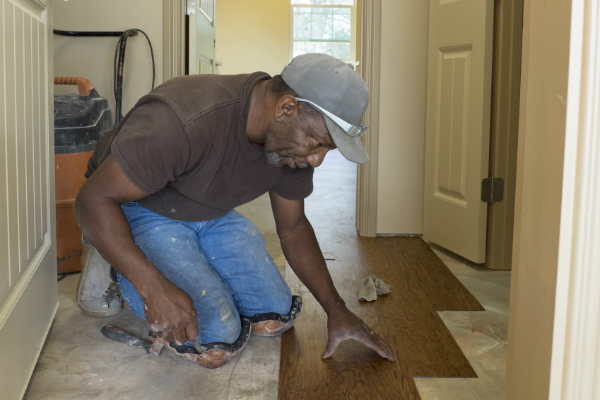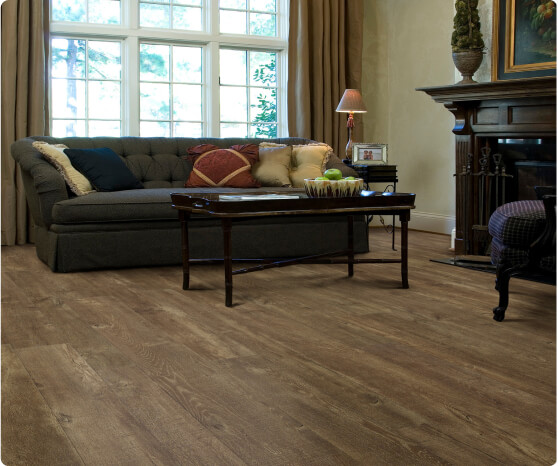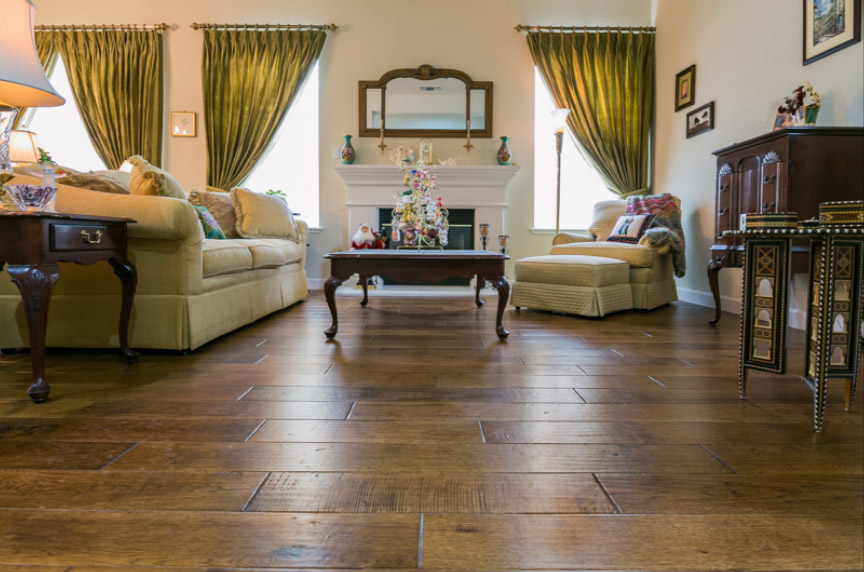Tile flooring and hardwood are two popular options for homeowners looking to enhance the aesthetics and functionality of their living spaces. Each option has its own set of advantages, making it a good choice depending on individual preferences and needs.
Both tile flooring and hardwood offer unique characteristics that can greatly impact the overall look and feel of a room. Tile flooring is known for its durability, easy maintenance, and wide range of design options. On the other hand, hardwood provides a timeless appeal, natural warmth, and the ability to be refinished over time.
By exploring the differences between these two flooring options, we aim to provide you with valuable insights that will assist in determining the ideal choice for your home renovation or improvement project.

Table of Contents
ToggleKey Differences Between Tile And Hardwood Flooring
Appearance And Comfort Comparison
Hardwood floors have a timeless beauty that adds warmth to any space. The natural look of real wood flooring creates a cozy and inviting atmosphere. On the other hand, tile flooring offers a wide range of design options. Whether you prefer sleek modern looks or classic patterns, there’s a tile style for every taste. However, it’s important to note that tile can feel cold underfoot, especially in colder climates.
Durability Comparison
Hardwood floors are quite sturdy but can be prone to scratches and dents over time. They may require occasional refinishing to maintain their appearance. On the other hand, tile flooring is highly durable and resistant to wear and tear. It is an excellent choice for high traffic areas such as kitchens or entryways. However, it’s worth mentioning that dropping heavy objects on tiles can cause cracks or chips.
Maintenance Requirements For Both Types Of Floors
Maintaining hardwood floors involves regular sweeping or vacuuming to remove dirt and debris that can scratch the surface. Occasionally, they may need refinishing to restore their shine. In contrast, cleaning tile flooring is relatively easy with regular mopping using mild cleaners. Tiles are also resistant to stains and spills, making them suitable for areas prone to messes like bathrooms or kitchens.
Lifespan Of Tile VS Hardwood Flooring
With proper care, hardwood floors can last for decades or even longer. Real hardwood floors are known for their longevity when properly maintained. Similarly, tile flooring has an exceptionally long lifespan due to its durability and resistance to wear. Both options offer excellent longevity compared to other types of flooring materials.
Cost Comparison
Installation Process
There are some key differences in the installation process. Hardwood floors are installed by nailing or gluing individual planks onto a subfloor. This process requires precision and skill to ensure that each plank is properly aligned and secured.
On the other hand, tile installation involves precise measurements, adhesive application, grouting, and sealing processes. Each tile needs to be placed carefully to create a level surface. The grouting and sealing steps are important for maintaining the durability and longevity of the tile floor.
It’s worth noting that hardwood installation usually takes longer than tile installation due to the complexity involved. The individual planks need to be carefully laid out and secured, which can be time-consuming. Tile installation may be faster since tiles come in larger sizes and can cover more area at once.
Resale Value Comparison: Hardwood Floors VS LVP
Both hardwood floors and Luxury Vinyl Plank (LVP) flooring have their advantages. Hardwood floors are generally considered a premium option by homebuyers and often contribute to higher resale value. They add a touch of elegance and sophistication to any home.
However, LVP flooring has gained popularity in recent years due to its durability, affordability, and realistic appearance. While it may not have the same prestige as hardwood floors, LVP can still enhance the overall appeal of a home and attract potential buyers who appreciate its benefits.
Ultimately, the resale value of your flooring choice will depend on various factors such as location, market trends, buyer preferences, and overall condition of your home. It’s always a good idea to consult with real estate professionals or conduct research specific to your area for accurate insights into how different types of flooring impact resale value.
Water Effects On Tile VS Hardwood
One important factor to consider is how these materials handle water. Let’s take a closer look at the moisture resistance of both options and how they respond to spills and excessive water.
Moisture Resistance Of Materials
Hardwood floors are known for their natural beauty, but they can be quite sensitive to moisture. It’s crucial to keep them away from wet areas like bathrooms where water exposure is common. If exposed to excessive moisture, hardwood floors can suffer from warping, buckling, or even mold growth.
On the other hand, tile flooring boasts impressive moisture resistance. Tiles are made from materials like ceramic or porcelain that are highly impermeable to water. This makes them an excellent choice for areas prone to spills or high humidity levels, such as kitchens and bathrooms. With proper installation and sealing, tile floors provide a robust barrier against water damage.
While there are methods available to improve the moisture resistance of hardwood floors—such as applying sealants—they may not be as effective as tiles in preventing long-term damage caused by water exposure.
Water Spills
Accidents happen, and spills occur in our homes regularly. How do tile flooring and hardwood handle liquid spills?
When a spill occurs on a hardwood floor, it’s essential to clean it up promptly. If left unattended, the liquid can seep into the wood fibers and cause staining or even structural damage over time. Hardwood floors require regular maintenance and care to prevent any adverse effects from water spills.
In contrast, tile flooring is waterproof by nature. The non-porous surface of tiles prevents liquids from penetrating into the material itself. This feature makes tiles an ideal choice for areas where frequent spills are expected—like kitchens or basements—where quick cleanup may not always be possible.
Benefits Of Luxury Vinyl Plank Flooring
Luxury Vinyl Plank (LVP) flooring is a popular choice for homeowners looking to achieve the look of natural materials like wood or stone without breaking the bank. Here are some key benefits of LVP that make it a great alternative to hardwood and tile flooring options.
Wide Range Of Designs
One of the major advantages of LVP is its versatility in design. With advancements in technology, manufacturers have been able to create vinyl planks that closely mimic the appearance of real wood or stone. Whether you prefer the rustic charm of oak or the sleek elegance of marble, there’s a wide range of designs available in LVP to suit your style and preferences.
Affordability Without Compromising Aesthetics
Compared to hardwood flooring, LVP offers a more budget-friendly option while still providing similar aesthetics. Hardwood floors can be quite expensive, especially if you’re looking for premium wood species. On the other hand, LVP allows you to achieve the same visual appeal at a fraction of the cost. So if you’re on a tight budget but still want that luxurious look, LVP is definitely worth considering.
Durability And Resilience
LVP is known for its durability and resilience, making it an excellent choice for high-traffic areas in your home. The wear layer on top protects against scratches, stains, and dents, ensuring that your floors remain beautiful even with daily use. LVP is resistant to moisture and spills, making it suitable for areas prone to water exposure like bathrooms and kitchens.
Enhanced Comfort Underfoot
Unlike tile flooring which can feel cold and hard underfoot, LVP offers enhanced comfort due to its softer surface. This makes it more pleasant to walk on and provides better insulation against noise transmission between floors. Whether you’re barefoot or wearing socks around the house, LVP offers a cozy feeling that can’t be matched by harder flooring options.
Easy Maintenance And Installation
Maintaining LVP floors is a breeze. Regular sweeping or vacuuming, along with occasional damp mopping, is usually sufficient to keep them looking their best. Unlike hardwood floors that require refinishing over time, LVP does not need sanding or resealing. Furthermore, the installation process for LVP is relatively simple and can often be done as a DIY project, saving you money on professional installation costs.
Luxury Vinyl Flooring VS Hardwood Cost Comparison
We discussed how luxury vinyl plank flooring offers a more affordable alternative to traditional hardwood floors, making it an attractive option for budget-conscious homeowners. By opting for luxury vinyl flooring, you can achieve the same elegant look of hardwood at a fraction of the cost.
We highlighted the benefits of luxury vinyl plank flooring, emphasizing its water resistance compared to both tile and hardwood. This makes it an ideal choice for areas prone to moisture or spills, such as kitchens and bathrooms. With luxury vinyl flooring, you don’t have to worry about warping or damage caused by water exposure.
In conclusion, when considering whether to choose tile or hardwood for your home, it’s important to weigh the cost factor. Luxury vinyl plank flooring provides a cost-effective solution without compromising on style or durability. If you’re looking for an affordable yet visually appealing flooring option that can withstand water-related challenges, luxury vinyl is definitely worth considering. Make an informed decision based on your preferences and needs – choose luxury vinyl plank flooring for a beautiful and practical home upgrade today!
Conclusion
In the ultimate showdown between tile flooring and hardwood, both contenders bring a unique set of advantages and considerations to the table. As homeowners navigate the decision-making process, it becomes apparent that the choice between tile and hardwood ultimately depends on individual preferences, lifestyle, and the specific requirements of each room.
Tile flooring emerges as the undisputed champion when it comes to durability, moisture resistance, and easy maintenance. Its versatility in design, ranging from sleek modern styles to classic patterns, allows for endless customization possibilities. In high-traffic areas like kitchens and bathrooms, where spills and moisture are common, tile proves to be a resilient and practical choice.
On the other hand, hardwood exudes timeless charm and warmth, creating a cozy atmosphere in any room. Its natural beauty and the ability to be refinished give it an enduring appeal. While hardwood may require more diligent care to prevent scratches and water damage, the investment often pays off in the form of increased home value and a luxurious aesthetic.
In conclusion, there is no one-size-fits-all answer in the tile versus hardwood debate. Homeowners must weigh the pros and cons based on their unique circumstances and preferences. Consider the specific demands of each space, the desired aesthetic, and the long-term commitment to maintenance. Whether opting for the sleek resilience of tile or the timeless allure of hardwood, the ultimate decision is a personal one that reflects the homeowner’s vision for comfort, style, and practicality.
Struggling To Find The Perfect Tile Flooring That Aligns With Your Unique Vision?
Nestled in the bustling heart of Concord, California, K Floors is your go-to solution for bringing that vision to life. We’re more than just a flooring company; we’re your partners in creating spaces that exude quality, reliability, and an unmatched selection. Whether you’re envisioning the classic elegance of marble tiles, the rustic charm of ceramic, or the modern appeal of porcelain, our range is as varied as your imagination.
The K Floors difference is unmistakable. Eliminate the guesswork in selecting the ideal tile flooring. Our team of seasoned experts is committed to assisting you at every turn. From complimentary in-home consultations, where we bring our expertise right to your doorstep, to our collaborations with leading vendors, we ensure that excellence isn’t just a claim—it’s our hallmark. Explore our extensive collection, featuring a variety of tile options including Ceramic, Porcelain, Mosaic, and more. Your perfect floor is not just a purchase; it’s a carefully made choice.
At K Floors, we’re dedicated to providing an experience, not just a sale. Based in Concord, California, we’ve skillfully merged traditional craftsmanship with modern styles, ensuring every tile we lay down transforms your space into a place that feels like home. Whether it’s a residential makeover or a commercial revamp, each project we embrace is a reflection of our dedication to quality and authenticity. So why wait? Step into K Floors, and let’s embark on the journey to your ideal tiled floor together.
Disclaimer
The materials available on this website are for informational and entertainment purposes only and not to provide legal advice. You should contact your attorney to obtain advice concerning any particular issue or problem. You should not act or refrain from acting based on any content included in this site without seeking legal or other professional advice. The information presented on this website may not reflect the most current flooring developments. No action should be taken in reliance on the information contained on this website and we disclaim all liability concerning actions taken or not taken based on any or all of the contents of this site to the fullest extent permitted by law.




